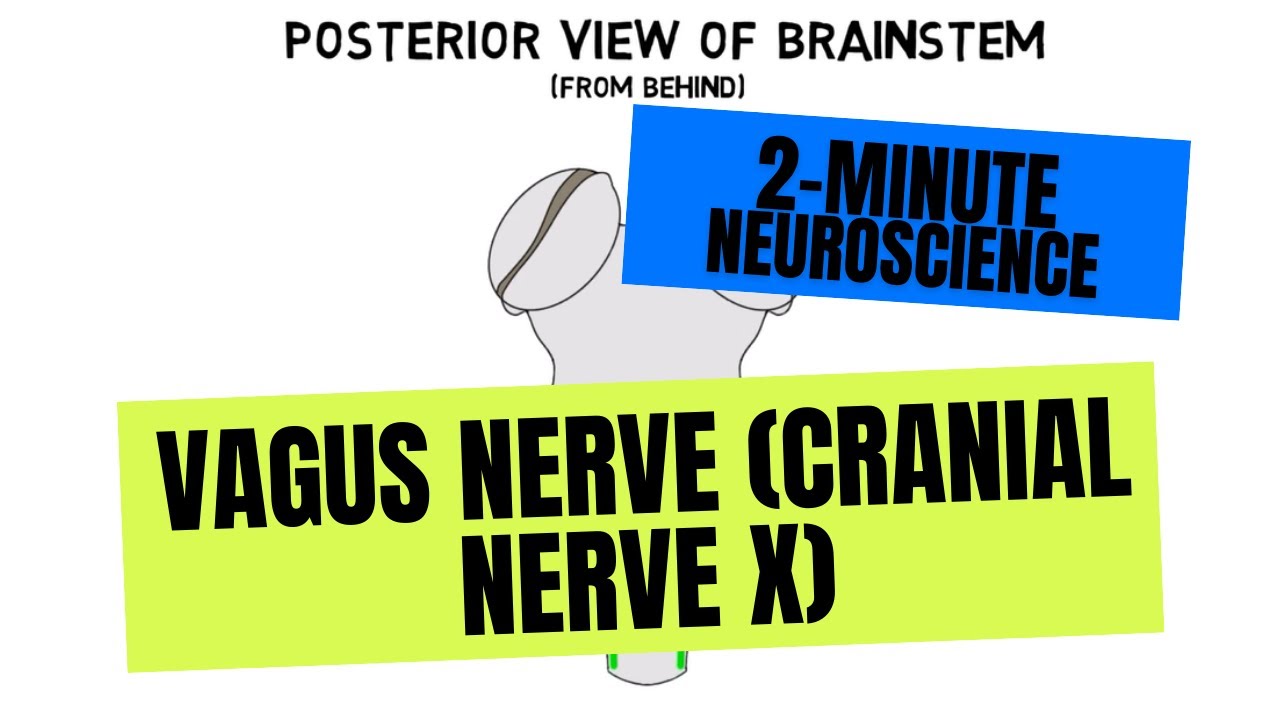The Vagus Nerve: The Hidden Bridge Between Body and Mind (and Why It Matters for Deep Healing)
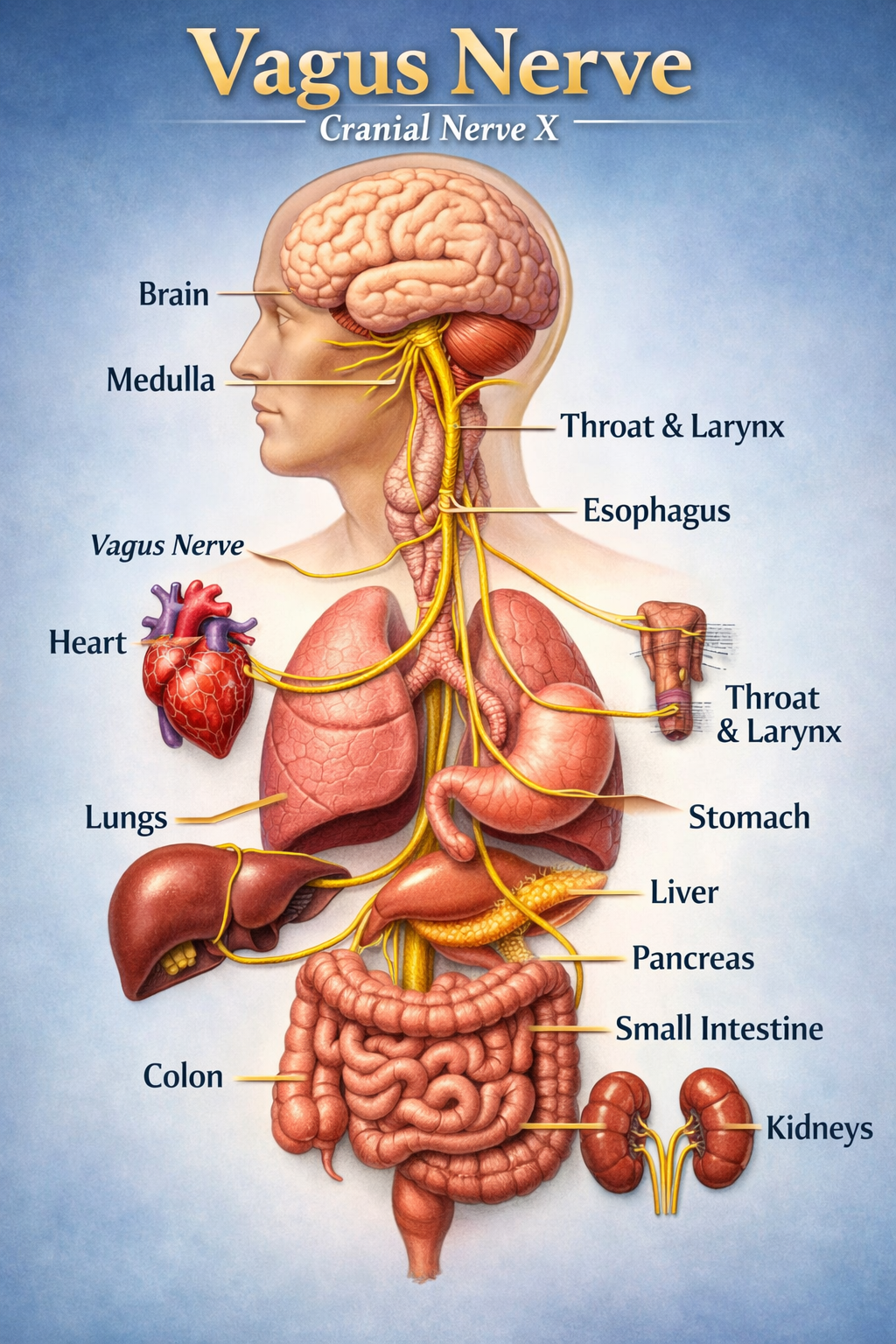
Where Trauma, Physiology, and Consciousness Meet
For decades, healing models treated the mind and body as separate domains. Psychology spoke to thoughts and emotions, while medicine addressed tissues, organs, and chemistry. Yet anyone who has lived through chronic stress, trauma, or persistent pain knows this division is artificial.
- Fear tightens the chest, abdomen, back and knees
- Grief weakens the lungs.
- Excessively worrying will hurt the digestion, stomach and spleen
- Anger tightens the jaw, shoulders and liver
I constantly witness how Long‑term stress reshapes posture, breath, immune function, and even identity. At the center of this lived reality sits a nerve few people truly understand — the vagus nerve. This single neural pathway may be the most important biological bridge between experience and physiology, between memory and metabolism, between safety and survival. In my clinical work with trauma, chronic pain, and nervous‑system dysregulation, I’ve seen again and again that sustainable healing does not come from insight alone. It comes from restoring regulation, and the vagus nerve is a primary gateway.
First, let's dive into the anatomy of this extraordinary nerve. Watch this great video tutorial
1. The Vagus Nerve: Anatomy With Meaning
The vagus nerve (cranial nerve X) is the longest and most complex cranial nerve in the human body. Emerging from the brainstem, it descends through the neck and branches into the heart, lungs, diaphragm, liver, stomach, intestines, and pelvic organs. More than 80% of its fibres are afferent, meaning they carry information from the body to the brain, not the other way around. This alone challenges the idea that the brain is always in charge. The body is constantly informing consciousness.
What this means practically:
- Your organs are continuously shaping your mood, perception, and sense of safety
- Trauma stored in tissues alters brain signalling
- Healing must involve the body, not just cognition
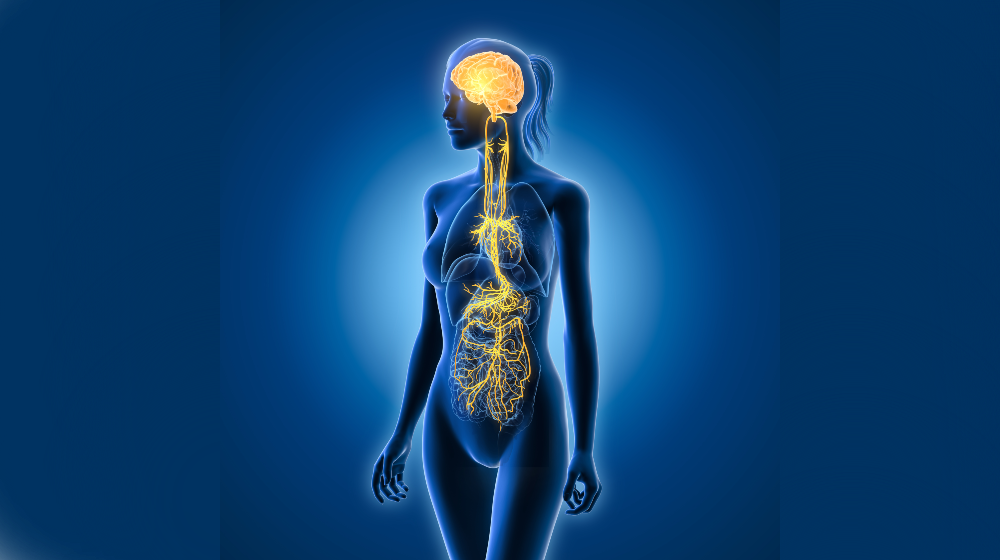
2. Evolutionary Perspective: A Nerve Older Than Language
From an evolutionary lens, the vagus nerve is ancient. Long before humans developed complex language or abstract reasoning, survival depended on rapid assessment of safety and threat.The vagus nerve evolved to answer one fundamental question:
Am I safe enough to relax, digest, connect, and heal — or must I mobilize to survive?
This binary still governs modern nervous systems, even though today’s threats are often emotional, relational, or symbolic rather than physical.When trauma overwhelms the system, vagal signaling becomes distorted. The body may remain in fight, flight, or shutdown long after danger has passed.
3. Polyvagal Theory: Understanding States, Not Labels
Stephen Porges’ Polyvagal Theory offers a framework that aligns closely with clinical reality.Rather than one stress response, we have three primary autonomic states:
- Ventral Vagal State (Safety & Connection)
- Calm alertness
- Social engagement
- Creativity, empathy, digestion, healing
- Sympathetic State (Mobilization)
- Fight or flight
- Anxiety, anger, hypervigilance
- Dorsal Vagal State (Shutdown)
- Collapse, numbness, dissociation
- Chronic fatigue, depression, hopelessness
Trauma is not defined by the event — but by the loss of flexible movement between these states.
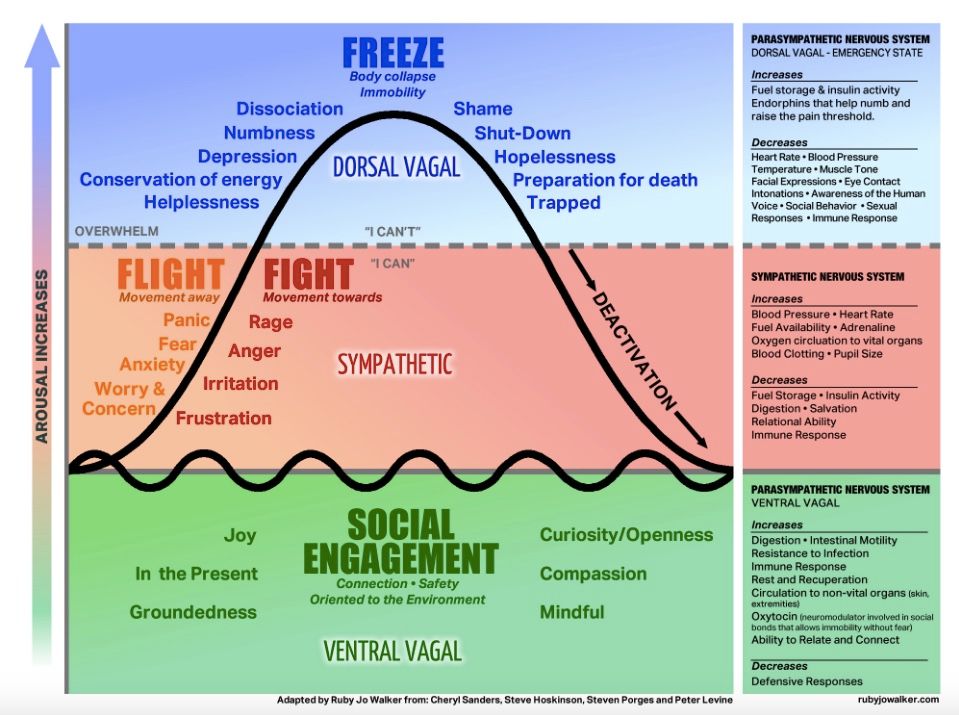
4. The Vagus Nerve and Chronic Pain
Chronic pain is rarely just a tissue problem.When vagal tone is low:
- Pain thresholds drop
- Inflammation increases
- Muscles remain guarded
- The brain amplifies threat signals
Pain becomes a learned nervous‑system pattern.In NeuroPath Reset Method, we don’t chase symptoms. We restore neural safety so the brain can down‑regulate pain signaling naturally.
5. The Gut–Brain Axis: Emotion Has a Digestive Signature
The vagus nerve is the main communicator between the gut microbiome and the brain.This explains why:
- Anxiety alters digestion
- IBS often coexists with trauma history
- Gut inflammation affects mood and cognition
When vagal signaling improves, digestion often normalizes without dietary obsession.Image suggestion: Gut–brain axis illustration highlighting vagus nerve communication.
6. Vagal Tone: The Missing Metric of Health
Vagal tone reflects how adaptable your nervous system is.High vagal tone = resilience Low vagal tone = rigidityMarkers of healthy vagal tone include:
- Stable heart rate variability (HRV)
- Deep spontaneous breathing
- Emotional flexibility
- Capacity to recover quickly from stress
This is not willpower. It is physiology.
7. Trauma Is Not a Story — It’s a State
Many people understand their trauma intellectually yet remain stuck physiologically.Why? Because insight does not automatically rewire autonomic reflexes.The vagus nerve must experience safety repeatedly, rhythmically, and somatically.This is why purely cognitive approaches often plateau.
8. Shiatsu Therapy: Direct Access to the Vagus Nerve Through the Body
Shiatsu therapy is, at its core, vagal work — even though it was never framed in Western neurological language. Rooted in East Asian medicine, Shiatsu works through sustained, listening touch along meridians, fascia, breath, and postural reflexes. What it consistently does is signal safety, containment, and rhythm to the nervous system — the very conditions required for ventral vagal activation.From a neurophysiological perspective, Shiatsu:
- Engages mechanoreceptors that down-regulate sympathetic overdrive
- Influences vagal afferents through the neck, diaphragm, abdomen, and sacrum
- Supports interoceptive awareness — the body’s ability to sense itself
Clinically, I have seen Shiatsu restore regulation in individuals where talk therapy, medication, or exercise alone failed. This is because Shiatsu does not ask the nervous system to understand safety — it allows the body to experience it. Shiatsu meets the nervous system where trauma actually lives: in tone, breath, tissue, and rhythm.
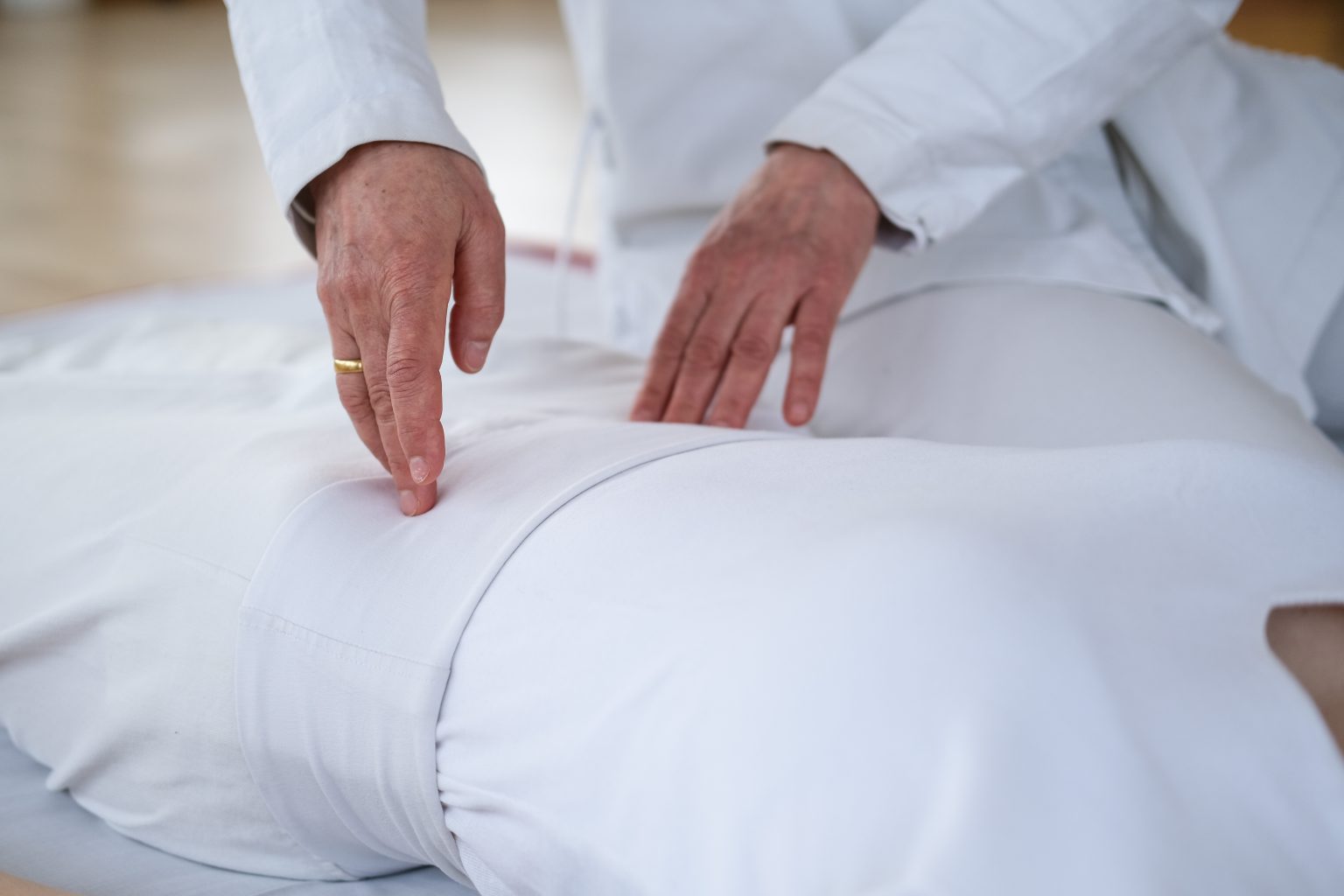
9. NeuroPath Reset Method®: A Nervous-System-Centered Approach to Healing
NeuroPath Reset Method was developed to address a central gap in modern healing models:
Most chronic pain and trauma therapies focus on techniques — not on restoring the nervous system’s capacity for regulation.
NeuroPath Reset Method integrates:
- Applied neuroscience
- Polyvagal-informed therapy
- Somatic awareness
- Manual and non-manual nervous system regulation
At its foundation, NeuroPath Reset Method works by resetting maladaptive neural loops that keep the body stuck in pain, threat, or shutdown.Rather than forcing change, the method restores:
- Accurate threat perception
- Vagal flexibility
- Coherent brain–body communication
This allows symptoms to resolve as a byproduct of regulation, not as a target.
10. How Shiatsu and NeuroPath Reset Method Work Together
Shiatsu provides the embodied entry point. NeuroPath Reset Method provides the neural map.Together, they:
- Re-establish safety at a tissue and autonomic level
- Rewire pain and trauma patterns stored in the nervous system
- Train the body to move fluidly between activation and rest
This integration is especially effective for:
- Chronic pain syndromes
- Developmental and complex trauma
- Burnout and nervous system exhaustion
- Persistent stress-related conditions
Where Shiatsu opens the door, NeuroPath Reset Method stabilizes the pathway.

11. Somatic Pathways to Vagal Regulation
Breath
Slow nasal breathing with extended exhale is one of the fastest vagal regulators.
Vibration
Humming, chanting, and toning stimulate vagal branches in the throat and middle ear.
Touch & Pressure
Safe touch, bodywork, and fascial engagement calm the nervous system.
Rhythm
Walking, rocking, drumming — rhythm organizes neural chaos.
Temperature
Cold facial exposure briefly activates vagal reflexes.
Presence
Felt sense awareness teaches the nervous system that the present moment is survivable.

12. Why Healing Must Become Experiential
The nervous system learns through experience, not explanation.To heal trauma and chronic pain, the body must repeatedly sense:
- Safety without collapse
- Activation without overwhelm
- Connection without threat
This is nervous‑system re‑education.
13. The Deeper Implication: Regulation Is Consciousness
At the deepest level, the vagus nerve shapes how we meet life. It influences:
- How open or guarded we are
- How much pleasure do we allow
- Whether we trust or brace
Healing the vagus nerve is not just clinical — it is existential.
Closing Reflection: From Technique to Transmission
Shiatsu Therapy and NeuroPath Reset Method are not add-ons to healing — they are expressions of a deeper truth: Healing happens when the nervous system remembers how to feel safe in the body.
The vagus nerve is the biological doorway. Touch, presence, rhythm, and attuned guidance are the keys. When we stop trying to fix the body and instead restore its regulatory intelligence, symptoms lose their purpose. And what remains is resilience, connection, and choice.
The vagus nerve is not a trend. It is not a hack. It is the biological foundation of embodiment, presence, and resilience. When we restore vagal integrity, we restore choice. And choice is the opposite of trauma.
Sincerely yours,
Mihael Mamychshvili
Founder, NeuroPath Reset Method
*For in-person trainings, go to:https://www.neuropathresetmethod.com/workshops-retreats
*For online courses: https://www.neuropathresetmethod.com/online-courses
